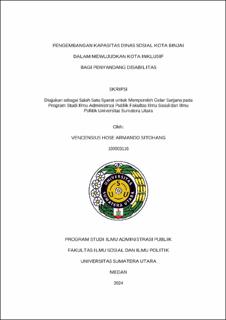| dc.description.abstract | An inclusive city is a concept that emphasises the importance of building
a friendly and accessible environment for all its citizens, including individuals with
disabilities. This is stated in Law No. 8 of 2016 concerning Persons with
Disabilities who in living their lives have 3 basic rights that must be fulfilled in
order to create welfare for persons with disabilities, namely the right to social
rehabilitation, social empowerment and social protection/security. In realising this,
the Social Service of Binjai City must increase its capacity so that the fulfilment of
the welfare of persons with disabilities can be realised. However, the Social Service
of Binjai City has not been able to optimally realise the welfare of persons with
disabilities, where the programmes implemented have not fulfilled the three basic
rights for persons with disabilities.
This research is entitled "Capacity Development of the Binjai City Social
Service in Realising an Inclusive City for Persons with Disabilities". This study
aims to determine and analyse the capacity development of the Binjai City Social
Service in its efforts to create an Inclusive City for persons with disabilities in Binjai
City. The research method used is descriptive research with a qualitative approach.
Data collection was carried out using interview, observation, and documentation
techniques. Data were obtained and analysed qualitatively with the approach of
capacity development theory proposed by Millen (2001), including organisational
structure, organisational policies, work mechanisms, organisational culture and
accountability.
The results of this study indicate that the Social Service of Binjai City has
not shown an increase in organisational capacity based on changes in
Organisational Structure, Policies, Work Mechanisms, Organisational Culture and
Accountability. In the Organisational Structure indicator, the Binjai City Social
Service has made nomenclature changes aimed at improving performance, but
there are still many employees who do not understand the problems of persons with
disabilities. In addition, the Social Rehabilitation Division also lacks employees,
thus reducing their performance in dealing with problems of persons with
disabilities. Then in the Policy indicator, the programmes and policies of the Social
Service of Binjai City for persons with disabilities have not paid attention to the
needs and welfare of persons with disabilities in Binjai City. In the Work
Mechanism indicator, the collaboration between the Binjai City Social Service and
institutions for persons with disabilities has not been maximised and is just a
formality. In the Organizational Culture indicator, there are still many employees
of the Social Rehabilitation Division of Binjai City who violate the rules and are
undisciplined at work, Finally, in the Accountability indicator, the Social Service
has not been responsible for carrying out data collection thoroughly and evenly,
and the programs carried out do not go through a communication process with
persons with disabilities. | en_US |





